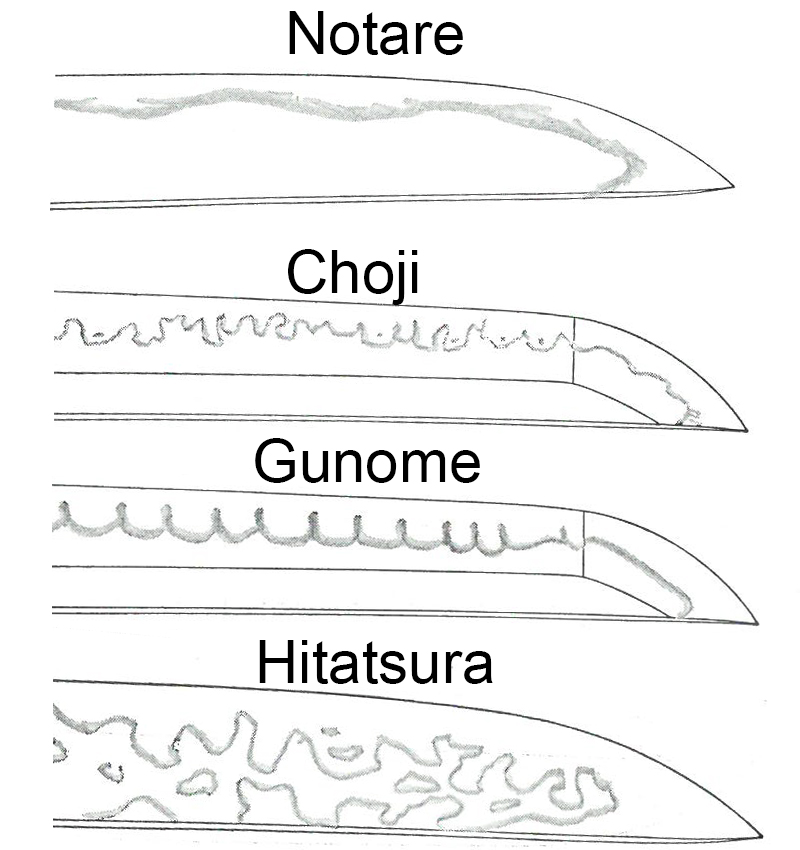By lyuesword | 05 August 2020 | 1 Comments
The Hamon on The Blade of Japanese Sword
The Hamon of the Japanese Sword - An Artistic Pattern That Reveals the Aesthetic Sence of The Swordsmith

Seeing a Japanese sword for the first time are captivated by the vividness of the hamon. The hamon refers to the part that is tempered with extra heat, so it is actual proof that the sword went through the tempering process.
The swordsmith could simply stretch the pattern straight and parellel to the blade edge, but this is the part where the smith shows his own individuality without reserve, and it is where they pour out their spirit in the sword-making.
The hamon doesn't affect the sharpness, but the artistic curve lines and gradation has a kind of beauty that captures every eye that beholds it. The pattern of the hamon differs between generation and school and has countless variations, making it a critical area in the examination process.
The hamon pattern can be roughly divided into suguha(straight blade) and midareba(wild blade).
Suguha
The suguha generally has its line going parallel to the blade edge, but it will certainly have a curve somewhere, so each suguha sword has its own characteristic.

Midare
The midareba, on the other hand, refers to all pattern that are not sugua, and these have their own individual names depending on their patterns.

Here are some other patterns of hamon. The choji(clove) has a pattern that looks like many cloves lined up together. The gunome pattern has a certain pattern lined up in an olderly maner. The hitatsura pattern has the tempering through the hiraji, shinogiji, and the ridge area.

Want a unique sword? Feel free to contact us:
Email: lyuesword@hotmail.com
Website: www.lyuesword.com
Custom Sword Page: www.lyuesword.com/Custom-Sword/customization-options/Create-Your-Own-Swords

Seeing a Japanese sword for the first time are captivated by the vividness of the hamon. The hamon refers to the part that is tempered with extra heat, so it is actual proof that the sword went through the tempering process.
The swordsmith could simply stretch the pattern straight and parellel to the blade edge, but this is the part where the smith shows his own individuality without reserve, and it is where they pour out their spirit in the sword-making.
The hamon doesn't affect the sharpness, but the artistic curve lines and gradation has a kind of beauty that captures every eye that beholds it. The pattern of the hamon differs between generation and school and has countless variations, making it a critical area in the examination process.
The hamon pattern can be roughly divided into suguha(straight blade) and midareba(wild blade).
Suguha
The suguha generally has its line going parallel to the blade edge, but it will certainly have a curve somewhere, so each suguha sword has its own characteristic.

Midare
The midareba, on the other hand, refers to all pattern that are not sugua, and these have their own individual names depending on their patterns.

Here are some other patterns of hamon. The choji(clove) has a pattern that looks like many cloves lined up together. The gunome pattern has a certain pattern lined up in an olderly maner. The hitatsura pattern has the tempering through the hiraji, shinogiji, and the ridge area.

Want a unique sword? Feel free to contact us:
Email: lyuesword@hotmail.com
Website: www.lyuesword.com
Custom Sword Page: www.lyuesword.com/Custom-Sword/customization-options/Create-Your-Own-Swords
Recently Reviews
Read MoreLeave a Reply
Your email address will not be published.Required fields are marked. *